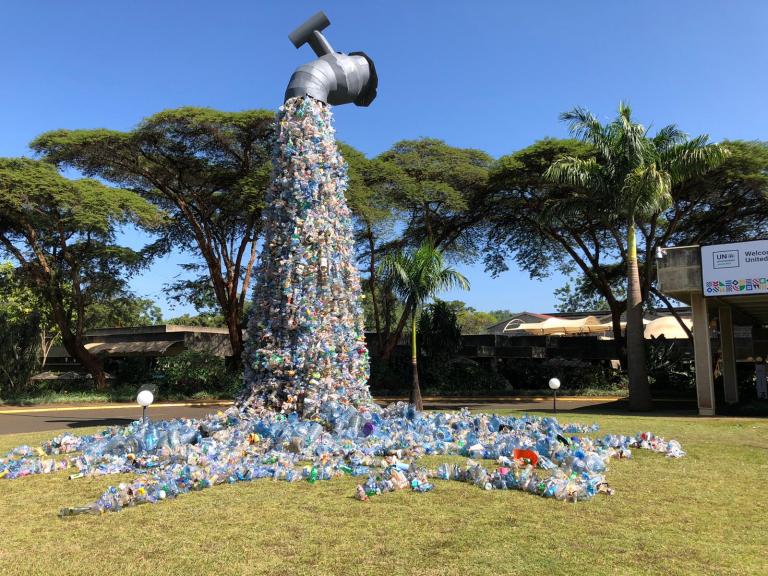-
Last updated on

The harmful subsidies mainly benefit large-scale fishing (© Shutterstock).
In June 2022, the World Trade Organization (WTO) reached a partial agreement to end harmful fisheries subsidies, a successful initiative to which our FPS also contributed.

It is no secret that biodiversity is suffering tremendously around the world, not only on land, but equally in the oceans. Pollution from plastics and chemicals might be thought of as a major cause, but overfishing has also proved detrimental to fish stocks. Then it is distressing to note that some $22 billion is spent annually on subsidies that encourage overfishing! Eighty per cent of these funds flow to large-scale fishing fleets and this makes it especially difficult for small-scale fishermen to get by.
SDG 14.6
The great importance of the problem was already recognised when the international community established the Sustainable Development Goals in 2015. Indeed: under SDG 14 (conservation and sustainable use of oceans), a separate target was set, SDG 14.6, which aimed to put a stop to these 'harmful subsidies' by 2020. SDG 14.6 mentions right away that this should be done within the World Trade Organization (WTO).
Ongoing negotiations within WTO
The WTO was only established in 1995, making it a relatively young branch of the UN tree, with 164 member states representing over 98% of global trade and global GDP. Unfortunately, the WTO does not function as it should. The rivalry between China and the USA plays a role in this, 'developing' countries such as India are throwing their weight in, the USA all but withdrew from the WTO under President Trump, and so on.
As a result, for instance, the negotiations to end harmful fisheries subsidies has dragged on for 21 years. After all, an agreement can only be concluded if there is complete consensus on it. That has finally changed. In June 2022, the WTO was able to reach a partial agreement on these harmful subsidies at its 12th Ministerial Conference in Geneva.

Satisfied faces at the end of the 12th WTO conference. On the far left, in the front, stands WTO chairwoman Ngozi Okonjo-Iweala (© WTO/Jay Louvion).
Partial agreement
The EU certainly contributed to that success, and within the EU the participating delegation from the FPS Foreign Affairs, especially from our Directorate General of European Affairs and our post in Geneva. The new dynamic brought by Director-General Ngozi Okonjo-Iweala within the WTO also played a crucial role.
In the agreement reached, WTO members commit as follows:
- not to subsidise illegal, unreported and unregulated fishing, leaving some leeway for developing countries within their own EEZ or Exclusive Economic Zone;
- not to subsidise fishing that depletes already overfished stocks, with some flexibility within the EEZ;
- not to subsidise fishing at sea and to take special care when granting subsidies for fish stocks whose status is not known;
- to improve transparency and reporting of fisheries subsidies;
- to establish a fund, replenished by voluntary contributions, to assist developing countries in implementing the Agreement.
However, no agreement has yet been found on the discipline about overfishing and overcapacity, fuel subsidies, and the 'special and differential treatment' that provides more flexibility for developing countries. WTO member countries agreed to conclude negotiations on the remaining issues four years after the entry into force of the partial agreement.
What now?
Reaching an agreement is only the first stage. It is now up to WTO member countries to enshrine the agreements in their own legislation. An agreement does not really take effect until two thirds of the members have ratified it. Past experience shows that this process can take several years.
However, a first, extremely important step has already been taken, and that is a feather in the cap of the WTO, and of our colleagues. The success is also a boost for this International Year of Artisanal Fisheries and Aquaculture and for the major UN Ocean Conference that was held in Lisbon at the end of June. The latter is being followed up in Belgium mainly by the FPS Environment.
View the statement by Minister David Clarinval
More on Planet

Floriade Expo 2022: get inspiration for the green city of the future
In Almere (the Netherlands), you can find tons of inspiration from all over the world for a sustainable, green future. Belgium i...

Land restoration, more than desperately needed
From 9 to 20 May, Ivory Coast is set to host the 15th Conference of the Parties to the United Nations Convention to Combat Deser...

Ridding the world of plastic pollution
A legally binding, ambitious treaty must be concluded by 2024 in order to address plastic pollution. This was the resolution mad...
